【中考复习方案】2015届九年级英语复习课件(人教):第10课时 Units1—2 Book 8B
文档属性
| 名称 | 【中考复习方案】2015届九年级英语复习课件(人教):第10课时 Units1—2 Book 8B |
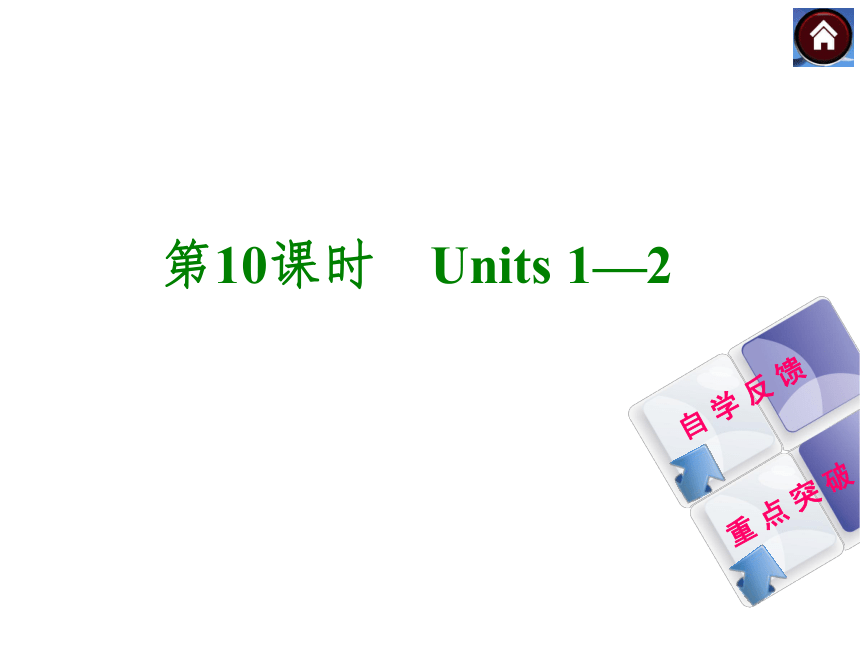
|
|
| 格式 | zip | ||
| 文件大小 | 197.1KB | ||
| 资源类型 | 教案 | ||
| 版本资源 | 人教新目标(Go for it)版 | ||
| 科目 | 英语 | ||
| 更新时间 | 2014-12-04 00:00:00 | ||
图片预览

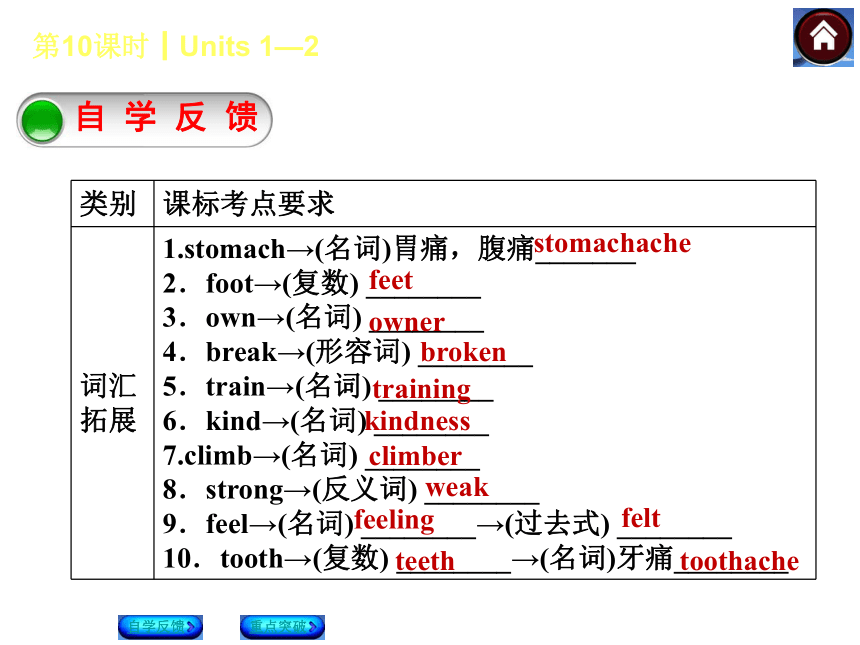
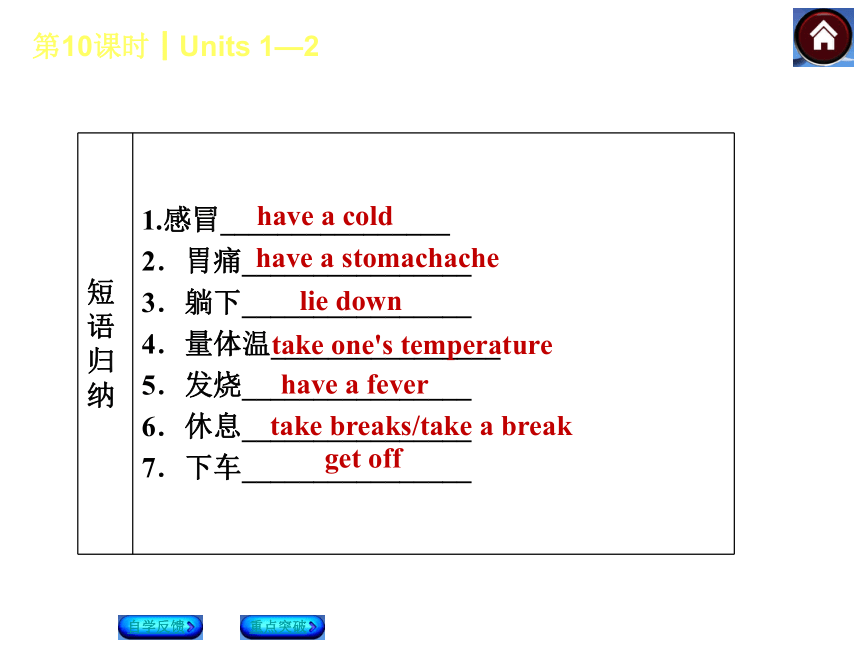
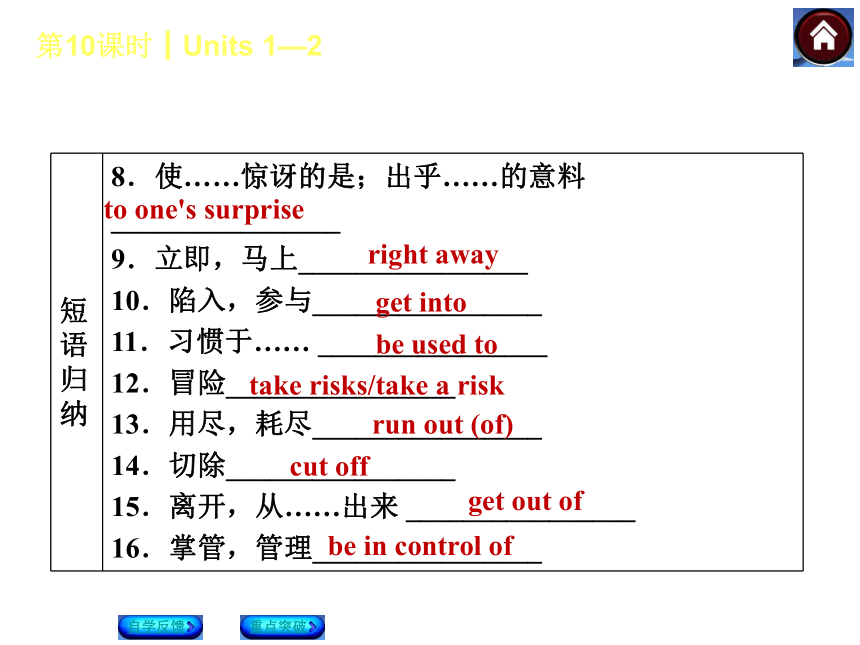
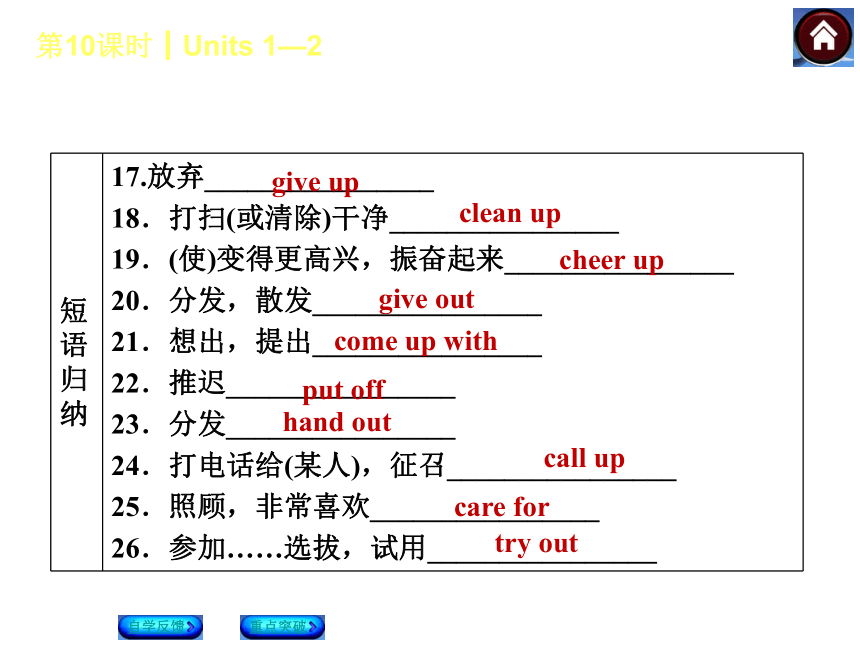
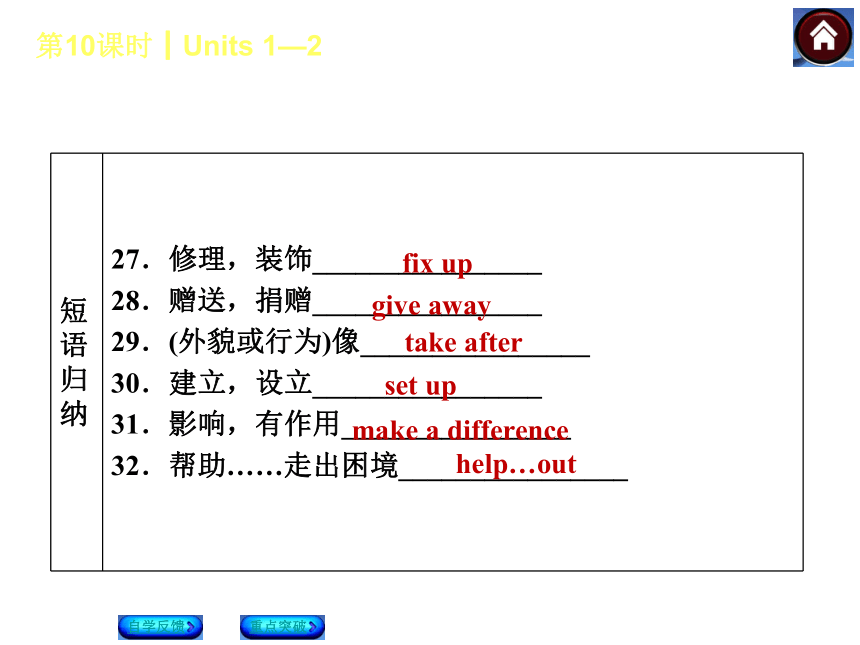
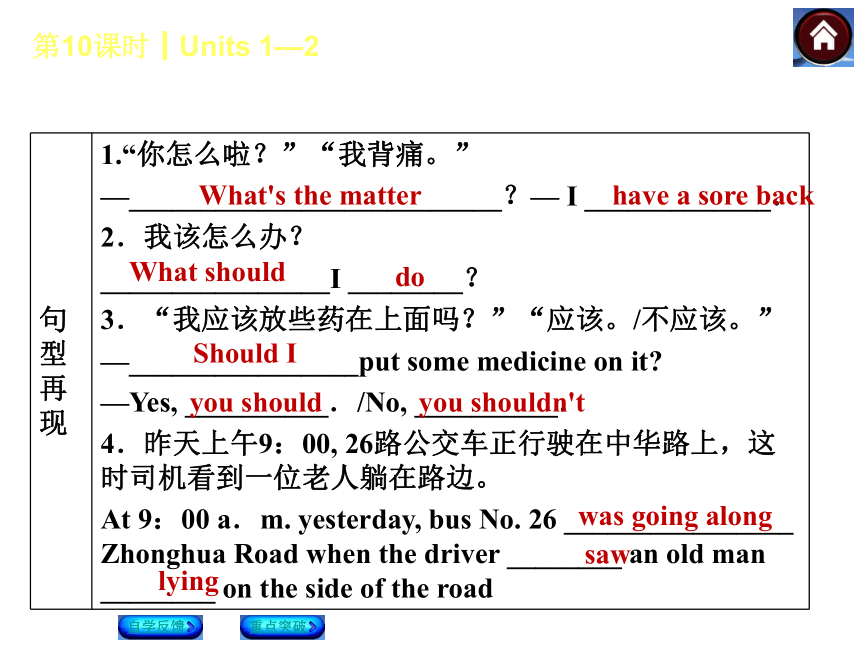
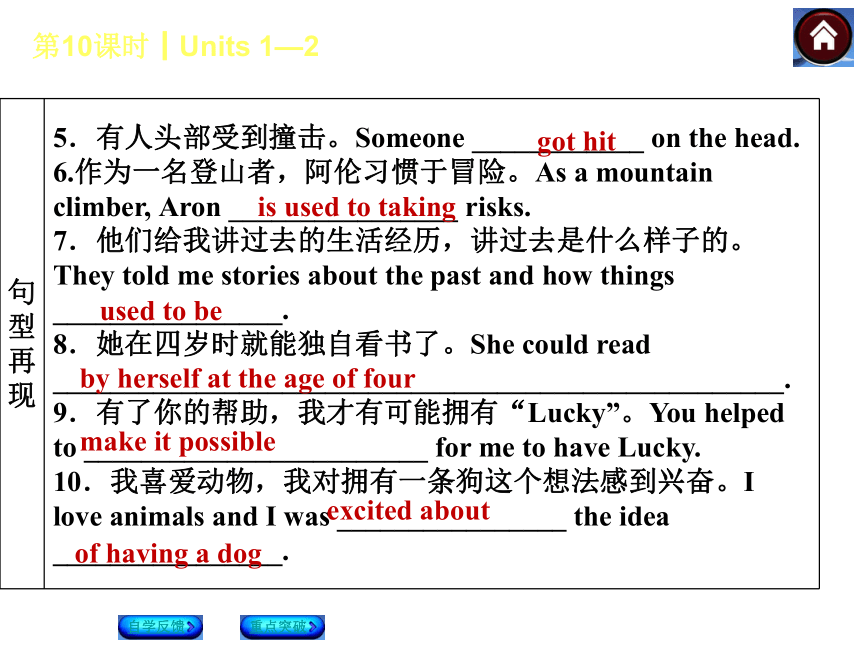
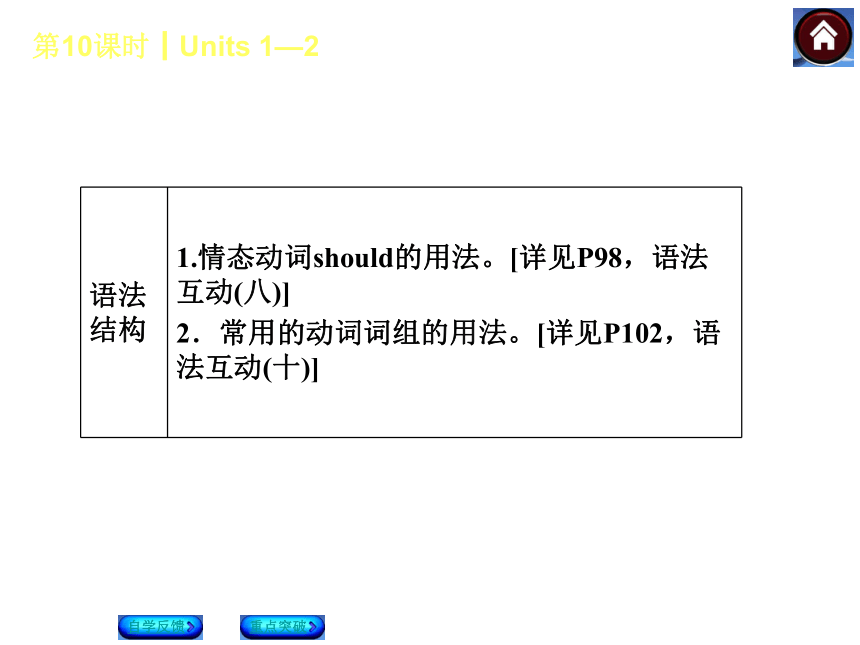
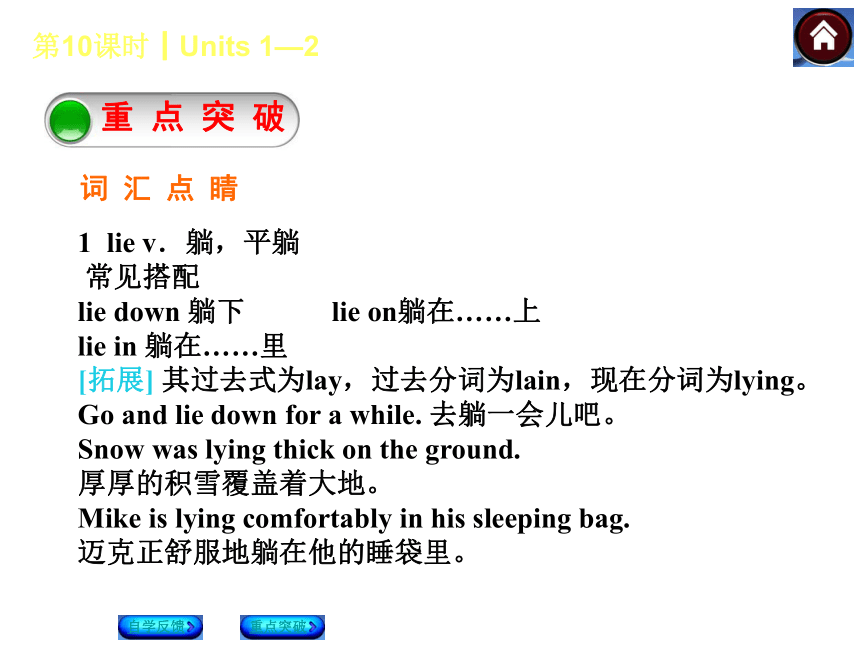
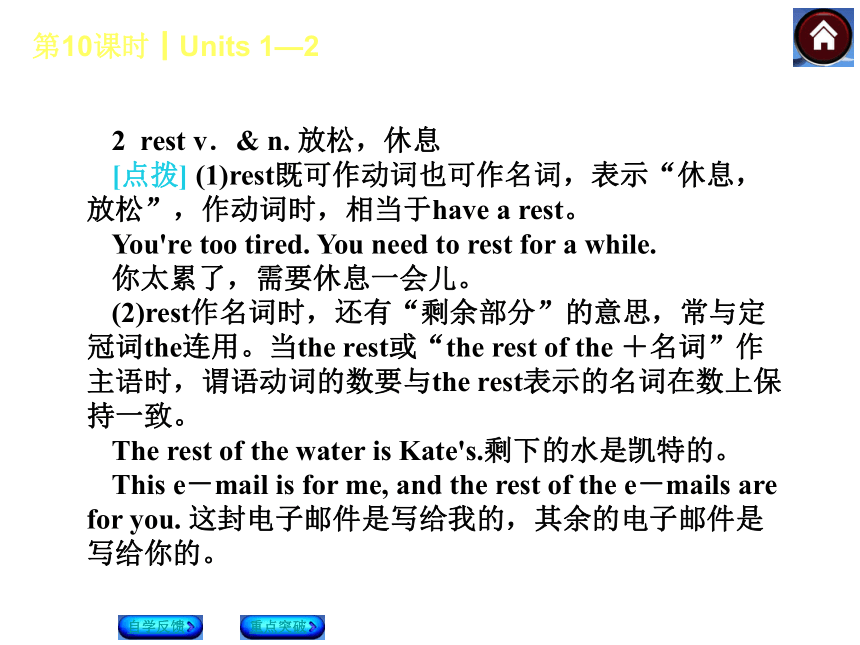
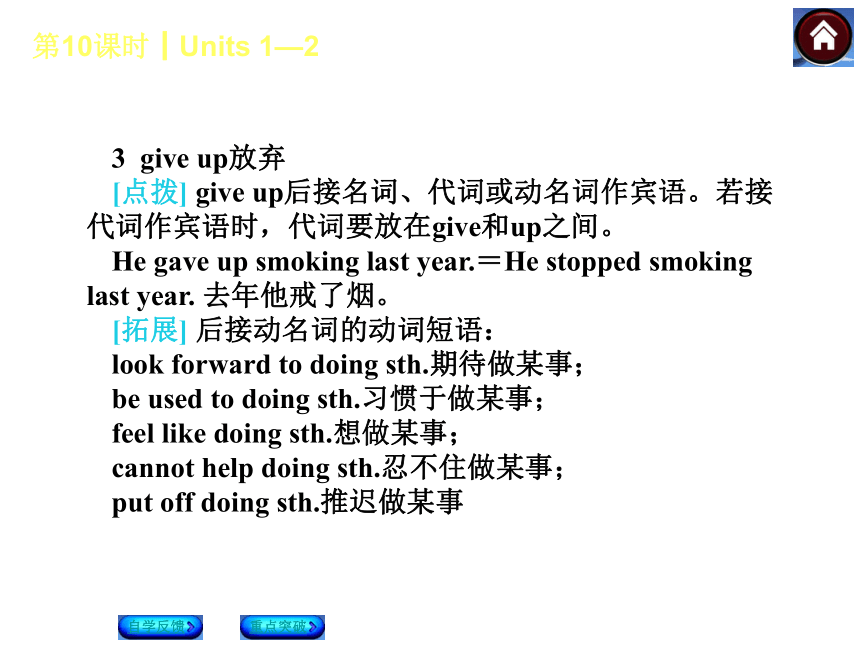
文档简介
课件33张PPT。第10课时 Units 1—2 自 学 反 馈重 点 突 破第10课时┃Units 1—2自学反馈重点突破自 学 反 馈stomachachefeetownerbroken trainingkindnessclimberweakfeelingfeltteethtoothache第10课时┃Units 1—2have a cold 自学反馈重点突破have a stomachachelie downtake one's temperaturehave a fevertake breaks/take a breakget off to one's surprise自学反馈重点突破第10课时┃Units 1—2right away get intobe used totake risks/take a riskrun out (of)cut offget out ofbe in control ofgive up自学反馈重点突破第10课时┃Units 1—2clean upcheer upgive outcome up withput offhand outcall upcare fortry outfix up 自学反馈重点突破第10课时┃Units 1—2give awaytake afterset upmake a differencehelp…out第10课时┃Units 1—2What's the matter自学反馈重点突破have a sore back What should do Should I you should you shouldn't was going alongsaw lying 第10课时┃Units 1—2got hit自学反馈重点突破is used to takingused to beby herself at the age of fourmake it possibleexcited aboutof having a dog第10课时┃Units 1—2自学反馈重点突破第10课时┃Units 1—2词 汇 点 睛1 lie v.躺,平躺
常见搭配
lie down 躺下 lie on躺在……上
lie in 躺在……里
[拓展] 其过去式为lay,过去分词为lain,现在分词为lying。
Go and lie down for a while. 去躺一会儿吧。
Snow was lying thick on the ground.
厚厚的积雪覆盖着大地。
Mike is lying comfortably in his sleeping bag.
迈克正舒服地躺在他的睡袋里。重 点 突 破自学反馈重点突破第10课时┃Units 1—2自学反馈重点突破2 rest v.& n. 放松,休息
[点拨] (1)rest既可作动词也可作名词,表示“休息,放松”,作动词时,相当于have a rest。
You're too tired. You need to rest for a while.
你太累了,需要休息一会儿。
(2)rest作名词时,还有“剩余部分”的意思,常与定冠词the连用。当the rest或“the rest of the +名词”作主语时,谓语动词的数要与the rest表示的名词在数上保持一致。
The rest of the water is Kate's.剩下的水是凯特的。
This e-mail is for me, and the rest of the e-mails are for you. 这封电子邮件是写给我的,其余的电子邮件是写给你的。第10课时┃Units 1—2自学反馈重点突破3 give up放弃
[点拨] give up后接名词、代词或动名词作宾语。若接代词作宾语时,代词要放在give和up之间。
He gave up smoking last year.=He stopped smoking last year. 去年他戒了烟。
[拓展] 后接动名词的动词短语:
look forward to doing sth.期待做某事;
be used to doing sth.习惯于做某事;
feel like doing sth.想做某事;
cannot help doing sth.忍不住做某事;
put off doing sth.推迟做某事第10课时┃Units 1—2自学反馈重点突破2014·山西Many successful people have the same quality—they never ________ no matter what difficulties they've had.
A.give up B.stay up C.cheer up A中考典例根据“no matter what difficulties they've had.”可知他们从不“放弃”,故选A。 解析 第10课时┃Units 1—2自学反馈重点突破4 cheer v.欢呼,喝彩
[点拨] cheer up为“动词+副词”短语,其后跟代词作宾语时,代词要放在cheer与up之间。
Let's buy some flowers to cheer her up.
让我们买一些花使她高兴起来吧。
[拓展] cheerful adj.高兴的;快乐的
Hearing the news, all of us were cheerful.
听到这个消息,我们都兴高采烈。
[搭配] cheer up 使振奋;使高兴起来
They all cheered up when they heard the good news.当听到这个好消息时,他们都欢呼了起来。第10课时┃Units 1—2自学反馈重点突破2013·锦州—He looks unhappy today.
—Let's ________.
A.cheer him up B.help out him
C.look him after D.argue with himA中考典例根据“He looks unhappy today.”可知要使他“振奋起来”,故选A。 解析 第10课时┃Units 1—25 put off推迟
[点拨] put off为“动词+副词”短语,后接名词作宾语时放在off前后均可,若后接代词作宾语,代词则要放在put与off之间。类似用法的短语还有:
put out扑灭,熄灭(火) put on穿上
take off脱下 put up张贴
put away收起来 give out分发
cheer up使振奋 pick up捡起来
clean up(把……)打扫干净
[拓展] put off doing sth.意为“推迟做某事”。
He keeps putting off going to the dentist.
他把看牙医的事一拖再拖。自学反馈重点突破第10课时┃Units 1—2自学反馈重点突破2014·安顺Spring has come. We can't________ the plan. The trees must be planted this week.
A.put off B.make up
C.come up with D.look upA中考典例 put off意为“推迟”,make up意为“组成,编造”,come up with意为“想出(办法)”,look up意为“(在词典等)查找”。根据“The trees must be planted this week.”可知“计划不能推迟”,故选A。解析 第10课时┃Units 1—21 alone/lonely
(1)alone可以作形容词或副词,意为“单独的(地);孤独的(地)”,相当于by oneself,表示客观情况。
She lives alone in the village. 她独自一人生活在那个村庄里。
He is alone in the house. 他独自一人在屋里。
(2)lonely 只用作形容词, 带有感彩,形容因失去朋友、缺乏友爱和帮助而感到寂寞、甚至悲哀。
①作表语,意为“孤单的,孤独的”。
He feels lonely. 他感到孤独。
②作前置定语,修饰表示处所的名词,意为“荒凉的,偏僻的”。
The old man lives in a lonely mountain village.
这位老人住在一个偏僻的山村。
The old man lives alone, but he doesn't feel lonely.
这位老人独自生活,但他并不感到寂寞。自学反馈重点突破第10课时┃Units 1—2自学反馈重点突破2013·绥化Though he is ________ at home, he doesn't feel ________ for he has many things to do.
A.alone; lonely B.lonely; alone
C.alone; alone A中考典例第10课时┃Units 1—22 much too/too much/too many 自学反馈重点突破第10课时┃Units 1—2 We are much too busy. 我们非常忙。
Don't eat too much junk food.
别吃太多垃圾食品。
There are too many people in the street.
街上有太多人。自学反馈重点突破2013·孝感—Why are you so tired these days?
—Well, I have ________ homework to do.
A.too much B.too many
C.much too D.many too A中考典例第10课时┃Units 1—2巧 辩 异 同自学反馈重点突破 1 happen/take place
happen和take place 都可表示“发生”,但用法有所区别。
(1)happen 意为“(碰巧)发生”,指事情的发生带有一定的偶然性。
sb happen to do sth 某人碰巧做某事
sth happen to sb某人发生了某事
We happened to meet in the street.
我们碰巧在大街上相遇了。
What happened to you on April Fool's Day?
愚人节那天你发生了什么事? 第10课时┃Units 1—2 (2)take place意为“发生”,指事先计划好,事情按照预定的方向“发生”。
The concert will take place tomorrow.
音乐会明天举行。
[拓展] happen和take place都没有被动语态。自学反馈重点突破The Olympic Games of 2016 will______in Brazil.
[2013·临沂]
A take after B take off C take place D take awayC中考典例第10课时┃Units 1—2 2 when/while
两者都可引导时间状语从句,都有“当……的时候”之意,但其用法不同。
(1)when可指时间点,也可指时间段,其引导的从句中的谓语动词可以是短暂性动词,也可以是延续性动词。when也可以表示主句的动作发生在从句的动作之前或之后。
We were playing games when the teacher came here.
当老师来这儿时,我们正在玩游戏。
I found a wallet when/while I was walking in the park.
当我在公园散步时,我发现了一个钱夹。 自学反馈重点突破第10课时┃Units 1—2 (2)while 只指时间段,不指时间点,其引导的从句的谓语动词是延续性动词,多用于进行时态,强调主句动作是在从句所表示的时间内发生的,或者说从句与主句的动作同时发生。
My father was singing while I was playing the piano.
当我在弹钢琴时,我父亲在唱歌。自学反馈重点突破第10课时┃Units 1—2句 型 透 视自学反馈重点突破1 —What's the matter? 你怎么啦?
—I have a sore back. 我背痛。
[点拨] (1)What's the matter?=What's the trouble?=What's wrong? 怎么了?
如果表示“某人/物怎么了”,要在这几种形式后加上with sb./sth.。
What's the trouble/matter with you?
=What's wrong with you?你怎么了?
(2)“have+a+症状名词”表示具有某种“病症、症状”,有“患(病)”的意思,其中不定冠词a不可省略。
I have a headache and a cough.
我头疼而且咳嗽。第10课时┃Units 1—2自学反馈重点突破2014·南昌—Hi, John. ________?
—It's Lucy, my dog. Her leg is hurt.
A.How are you B.What's the matter
C.Who's that D.What's Lucy likeB中考典例根据“It's Lucy, my dog. Her leg is hurt.”可知是问出了什么事,故选B。解析 第10课时┃Units 1—2自学反馈重点突破2 They told me stories about the past and how things used to be.他们给我讲过去的生活经历,讲过去是什么样子的。
[句型] used to do sth. 表示“过去常常做某事”,指过去常常发生的动作或存在的状态,而现在不再做了。
He used to become angry. 他过去常常生气。
[拓展] (1)used to do 的否定形式为“didn't use to do”或“used not to do”,used not可缩写为usedn't。
Mr. Li didn't use to drink beer.
=Mr. Li usedn't to drink beer.
李先生过去不常喝啤酒。第10课时┃Units 1—2自学反馈重点突破(2)used to do 的疑问句形式是“Did…use to do?”或“Used…to do?”Did she use to get up early?
=Used she to get up early? 她过去经常早起吗?
(3)used to 的反意疑问句由助动词did(n't)或used(n't)构成。
Mario used to be late for school, didn't/usedn't he?
马里奥以前上学经常迟到,不是吗?
[拓展] (1)be used to doing sth. 表示“习惯于做某事”,to是介词,后跟名词、代词或动名词作宾语。
Amy is used to getting up early.艾米习惯早起。
(2)be used to do sth. =be used for doing sth.表示“被用来做某事”。
Knives are used to cut things.
=Knives are used for cutting things.
刀是用来切东西的。第10课时┃Units 1—2自学反馈重点突破2014·南充She used to ________ a bus to school, but now she is used to ________ to school.
A.taking; walk B.take; walk
C.taking; walking D.take; walkingD中考典例根据“It's Lucy, my dog. Her leg is hurt.”可知是问出了什么事,故选B。解析 第10课时┃Units 1—2自学反馈重点突破3 You helped to make it possible for me to have Lucky. 有了你的帮助,我才有可能拥有“Lucky”。
[点拨] “make it+形容词+to do sth.”意为“使做某事……”,it在句中作形式宾语,形容词作宾语补足语,动词不定式是真正的宾语。能用于该句型的动词还有think, feel, find等。
Our teacher makes it interesting to learn English.
我们的老师使学英语变得有趣。第10课时┃Units 1—2自学反馈重点突破2014 ·白银Televisions have made________ possible for us to watch movies at home.
A.that B.this C.it D.theyC中考典例第10课时┃Units 1—2自学反馈重点突破4 I love animals and I was excited about the idea of having a dog. 我喜爱动物,我对拥有一条狗这个想法感到兴奋。
常考搭配
be excited about 对……感到兴奋
be excited to do sth.=be excited about doing sth.
对做某事感到兴奋
You must be excited about your new job.
你一定对你的新工作感到兴奋吧。
He is excited about surfing in the sea.
他对海上冲浪感到兴奋。
常见搭配
lie down 躺下 lie on躺在……上
lie in 躺在……里
[拓展] 其过去式为lay,过去分词为lain,现在分词为lying。
Go and lie down for a while. 去躺一会儿吧。
Snow was lying thick on the ground.
厚厚的积雪覆盖着大地。
Mike is lying comfortably in his sleeping bag.
迈克正舒服地躺在他的睡袋里。重 点 突 破自学反馈重点突破第10课时┃Units 1—2自学反馈重点突破2 rest v.& n. 放松,休息
[点拨] (1)rest既可作动词也可作名词,表示“休息,放松”,作动词时,相当于have a rest。
You're too tired. You need to rest for a while.
你太累了,需要休息一会儿。
(2)rest作名词时,还有“剩余部分”的意思,常与定冠词the连用。当the rest或“the rest of the +名词”作主语时,谓语动词的数要与the rest表示的名词在数上保持一致。
The rest of the water is Kate's.剩下的水是凯特的。
This e-mail is for me, and the rest of the e-mails are for you. 这封电子邮件是写给我的,其余的电子邮件是写给你的。第10课时┃Units 1—2自学反馈重点突破3 give up放弃
[点拨] give up后接名词、代词或动名词作宾语。若接代词作宾语时,代词要放在give和up之间。
He gave up smoking last year.=He stopped smoking last year. 去年他戒了烟。
[拓展] 后接动名词的动词短语:
look forward to doing sth.期待做某事;
be used to doing sth.习惯于做某事;
feel like doing sth.想做某事;
cannot help doing sth.忍不住做某事;
put off doing sth.推迟做某事第10课时┃Units 1—2自学反馈重点突破2014·山西Many successful people have the same quality—they never ________ no matter what difficulties they've had.
A.give up B.stay up C.cheer up A中考典例根据“no matter what difficulties they've had.”可知他们从不“放弃”,故选A。 解析 第10课时┃Units 1—2自学反馈重点突破4 cheer v.欢呼,喝彩
[点拨] cheer up为“动词+副词”短语,其后跟代词作宾语时,代词要放在cheer与up之间。
Let's buy some flowers to cheer her up.
让我们买一些花使她高兴起来吧。
[拓展] cheerful adj.高兴的;快乐的
Hearing the news, all of us were cheerful.
听到这个消息,我们都兴高采烈。
[搭配] cheer up 使振奋;使高兴起来
They all cheered up when they heard the good news.当听到这个好消息时,他们都欢呼了起来。第10课时┃Units 1—2自学反馈重点突破2013·锦州—He looks unhappy today.
—Let's ________.
A.cheer him up B.help out him
C.look him after D.argue with himA中考典例根据“He looks unhappy today.”可知要使他“振奋起来”,故选A。 解析 第10课时┃Units 1—25 put off推迟
[点拨] put off为“动词+副词”短语,后接名词作宾语时放在off前后均可,若后接代词作宾语,代词则要放在put与off之间。类似用法的短语还有:
put out扑灭,熄灭(火) put on穿上
take off脱下 put up张贴
put away收起来 give out分发
cheer up使振奋 pick up捡起来
clean up(把……)打扫干净
[拓展] put off doing sth.意为“推迟做某事”。
He keeps putting off going to the dentist.
他把看牙医的事一拖再拖。自学反馈重点突破第10课时┃Units 1—2自学反馈重点突破2014·安顺Spring has come. We can't________ the plan. The trees must be planted this week.
A.put off B.make up
C.come up with D.look upA中考典例 put off意为“推迟”,make up意为“组成,编造”,come up with意为“想出(办法)”,look up意为“(在词典等)查找”。根据“The trees must be planted this week.”可知“计划不能推迟”,故选A。解析 第10课时┃Units 1—21 alone/lonely
(1)alone可以作形容词或副词,意为“单独的(地);孤独的(地)”,相当于by oneself,表示客观情况。
She lives alone in the village. 她独自一人生活在那个村庄里。
He is alone in the house. 他独自一人在屋里。
(2)lonely 只用作形容词, 带有感彩,形容因失去朋友、缺乏友爱和帮助而感到寂寞、甚至悲哀。
①作表语,意为“孤单的,孤独的”。
He feels lonely. 他感到孤独。
②作前置定语,修饰表示处所的名词,意为“荒凉的,偏僻的”。
The old man lives in a lonely mountain village.
这位老人住在一个偏僻的山村。
The old man lives alone, but he doesn't feel lonely.
这位老人独自生活,但他并不感到寂寞。自学反馈重点突破第10课时┃Units 1—2自学反馈重点突破2013·绥化Though he is ________ at home, he doesn't feel ________ for he has many things to do.
A.alone; lonely B.lonely; alone
C.alone; alone A中考典例第10课时┃Units 1—22 much too/too much/too many 自学反馈重点突破第10课时┃Units 1—2 We are much too busy. 我们非常忙。
Don't eat too much junk food.
别吃太多垃圾食品。
There are too many people in the street.
街上有太多人。自学反馈重点突破2013·孝感—Why are you so tired these days?
—Well, I have ________ homework to do.
A.too much B.too many
C.much too D.many too A中考典例第10课时┃Units 1—2巧 辩 异 同自学反馈重点突破 1 happen/take place
happen和take place 都可表示“发生”,但用法有所区别。
(1)happen 意为“(碰巧)发生”,指事情的发生带有一定的偶然性。
sb happen to do sth 某人碰巧做某事
sth happen to sb某人发生了某事
We happened to meet in the street.
我们碰巧在大街上相遇了。
What happened to you on April Fool's Day?
愚人节那天你发生了什么事? 第10课时┃Units 1—2 (2)take place意为“发生”,指事先计划好,事情按照预定的方向“发生”。
The concert will take place tomorrow.
音乐会明天举行。
[拓展] happen和take place都没有被动语态。自学反馈重点突破The Olympic Games of 2016 will______in Brazil.
[2013·临沂]
A take after B take off C take place D take awayC中考典例第10课时┃Units 1—2 2 when/while
两者都可引导时间状语从句,都有“当……的时候”之意,但其用法不同。
(1)when可指时间点,也可指时间段,其引导的从句中的谓语动词可以是短暂性动词,也可以是延续性动词。when也可以表示主句的动作发生在从句的动作之前或之后。
We were playing games when the teacher came here.
当老师来这儿时,我们正在玩游戏。
I found a wallet when/while I was walking in the park.
当我在公园散步时,我发现了一个钱夹。 自学反馈重点突破第10课时┃Units 1—2 (2)while 只指时间段,不指时间点,其引导的从句的谓语动词是延续性动词,多用于进行时态,强调主句动作是在从句所表示的时间内发生的,或者说从句与主句的动作同时发生。
My father was singing while I was playing the piano.
当我在弹钢琴时,我父亲在唱歌。自学反馈重点突破第10课时┃Units 1—2句 型 透 视自学反馈重点突破1 —What's the matter? 你怎么啦?
—I have a sore back. 我背痛。
[点拨] (1)What's the matter?=What's the trouble?=What's wrong? 怎么了?
如果表示“某人/物怎么了”,要在这几种形式后加上with sb./sth.。
What's the trouble/matter with you?
=What's wrong with you?你怎么了?
(2)“have+a+症状名词”表示具有某种“病症、症状”,有“患(病)”的意思,其中不定冠词a不可省略。
I have a headache and a cough.
我头疼而且咳嗽。第10课时┃Units 1—2自学反馈重点突破2014·南昌—Hi, John. ________?
—It's Lucy, my dog. Her leg is hurt.
A.How are you B.What's the matter
C.Who's that D.What's Lucy likeB中考典例根据“It's Lucy, my dog. Her leg is hurt.”可知是问出了什么事,故选B。解析 第10课时┃Units 1—2自学反馈重点突破2 They told me stories about the past and how things used to be.他们给我讲过去的生活经历,讲过去是什么样子的。
[句型] used to do sth. 表示“过去常常做某事”,指过去常常发生的动作或存在的状态,而现在不再做了。
He used to become angry. 他过去常常生气。
[拓展] (1)used to do 的否定形式为“didn't use to do”或“used not to do”,used not可缩写为usedn't。
Mr. Li didn't use to drink beer.
=Mr. Li usedn't to drink beer.
李先生过去不常喝啤酒。第10课时┃Units 1—2自学反馈重点突破(2)used to do 的疑问句形式是“Did…use to do?”或“Used…to do?”Did she use to get up early?
=Used she to get up early? 她过去经常早起吗?
(3)used to 的反意疑问句由助动词did(n't)或used(n't)构成。
Mario used to be late for school, didn't/usedn't he?
马里奥以前上学经常迟到,不是吗?
[拓展] (1)be used to doing sth. 表示“习惯于做某事”,to是介词,后跟名词、代词或动名词作宾语。
Amy is used to getting up early.艾米习惯早起。
(2)be used to do sth. =be used for doing sth.表示“被用来做某事”。
Knives are used to cut things.
=Knives are used for cutting things.
刀是用来切东西的。第10课时┃Units 1—2自学反馈重点突破2014·南充She used to ________ a bus to school, but now she is used to ________ to school.
A.taking; walk B.take; walk
C.taking; walking D.take; walkingD中考典例根据“It's Lucy, my dog. Her leg is hurt.”可知是问出了什么事,故选B。解析 第10课时┃Units 1—2自学反馈重点突破3 You helped to make it possible for me to have Lucky. 有了你的帮助,我才有可能拥有“Lucky”。
[点拨] “make it+形容词+to do sth.”意为“使做某事……”,it在句中作形式宾语,形容词作宾语补足语,动词不定式是真正的宾语。能用于该句型的动词还有think, feel, find等。
Our teacher makes it interesting to learn English.
我们的老师使学英语变得有趣。第10课时┃Units 1—2自学反馈重点突破2014 ·白银Televisions have made________ possible for us to watch movies at home.
A.that B.this C.it D.theyC中考典例第10课时┃Units 1—2自学反馈重点突破4 I love animals and I was excited about the idea of having a dog. 我喜爱动物,我对拥有一条狗这个想法感到兴奋。
常考搭配
be excited about 对……感到兴奋
be excited to do sth.=be excited about doing sth.
对做某事感到兴奋
You must be excited about your new job.
你一定对你的新工作感到兴奋吧。
He is excited about surfing in the sea.
他对海上冲浪感到兴奋。
